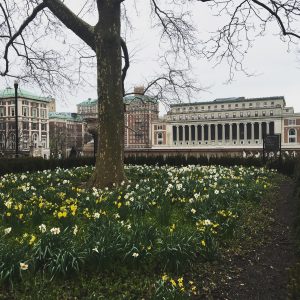Continuing from the last post in my series of grad school reflections, I’ve assembled a few final thoughts about things I wish I had known before starting at Columbia.
You are what you work on.
On our first day of orientation, we started introducing ourselves by name, college, and hometown—and were promptly told that the only introduction that matters is our name, field, and focus. That was terrifying for those of us with only a vague sense of what we wanted to study. I spent the first few weeks rapidly acquainting myself with a variety of topics because I didn’t even know much about the scholarship in my chosen field. Finally, I came up with something. And then something else. I went through a couple iterations of my personal introduction before even finalizing the topic. The lesson there was that if I ever did go back for a PhD, I would want a much better sense of what I’m doing in advance—because when you are what you work on, you’re not anybody until you’ve chosen a project.

Don’t let the language requirement paralyze you.
The language requirement matters and there’s no getting around that, but I found that it matters less in its own regard than in the sense that it’s hard to feel satisfied with the quality of research completed in just a single language (at least in European history). My work at the International Institute of Social History left me with documents in English, German, French, and Dutch. Fortunately, only the English and French were critical to my research and I had acquired enough self-taught French to be able to identify passages worth translating. In the meantime, my hesitation over how I would be able to satisfy the formal language requirement cost me (quite literally); I would have been better off if I had just prepared a little more last summer.
The duration of the program affects more than just how busy you are or how long before you move on.
When I selected my one-year program, I did so with the idea that spending two years on a degree that would seemingly get me little farther professionally than my BA would be unhelpful (I also didn’t know how long I would be able to survive in the city). In retrospect, I was thinking about it wrong. I should have been thinking in terms of what I would get out of those years intellectually. In my experience, a one-year MA program doesn’t leave enough time to think and reflect deeply on the material and its significance. Racing from one reading to the next just to afford a few free hours in the evening to rest your brain is not a good feeling, especially when you already feel like you’re playing catch up to the more experienced students. Sometimes there’s an advantage to the long game.
Unless you’re going on to a PhD, you’ll likely be left questioning the value of your MA.
There’s a sense of incompletion that comes with an MA in a field where the degree is mostly treated as a stepping stone towards a PhD. Because of all I have been exposed to in the last year, I leave my MA program feeling like I know less than when I began and worried that what I did learn will soon be forgotten. That said, I think I’ve found a way to make good use of my degree, but it certainly recalls the classic humanities degree dilemma of “What can I do with that?” The answer, of course, is nearly anything, given the proper experience. It’s the experience that tends to be the problem. I’m comparatively lucky in that regard.
Sometimes things turn out better than you expect.
Despite my insecurities and frustrations, I can’t dispute that the feedback I received throughout the year was overwhelmingly positive. I’m not entirely sure how my work compared to my peers, but my professors seemed pleased with it and I can’t imagine they were just being nice. So, if you’re off to grad school, the best piece of advice I can give is to keep things in perspective. Constantly striving in the endless pursuit of knowledge is the impossible cornerstone of grad school, but the expectation is still progress, not perfection. Give it your best shot without driving yourself to despair, and you might be surprised by the growth you achieve. I certainly was.
More resources:
If you’re thinking about grad school or are already there, I absolutely recommended the following resources for career planning and survival tips. They are comprehensive, accurate, and honest.
American Historical Association: Grad School from Start to Finish
